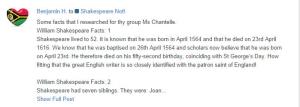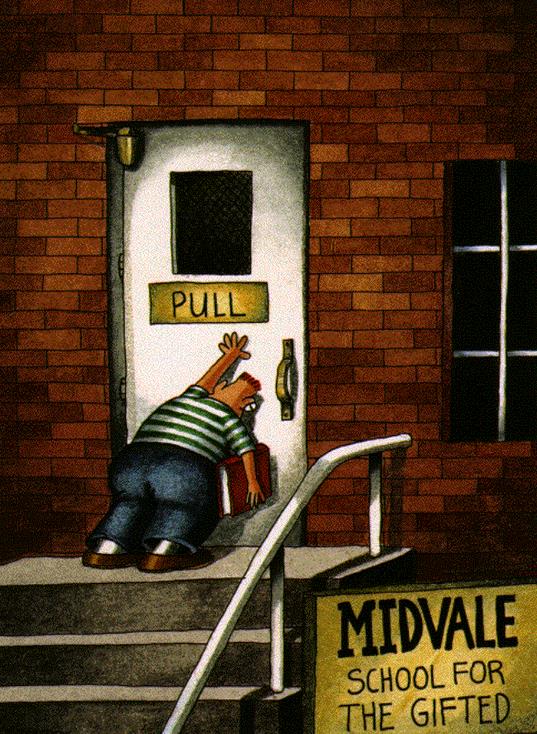We have different gifts, according to the grace given us. If a man’s gift is prophesying, let him use it in proportion to his faith. If it is serving, let him serve; if it is teaching, let him teach; if it is encouraging, let him encourage; if it is contributing to the needs of others, let him give generously; if it is leadership, let him govern diligently; if it is showing mercy, let him do it cheerfully. (NIV, Romans 12:5-8)
Up until this year, I had spent 4 years “teaching” what NBCS labeled as the AIM class. This was quite ironic as I’ve always had a belief that every child is gifted and talented in some way. Prior to taking on the class, I was given a stern word about keeping an open mind to how successful a G&T class could be. I was open to being proved wrong but, somehow, I doubted that.
Essentially, the AIM class was made up of 30 or so students who had been externally academically means tested in Mathematics and English and had, subsequently, performed well in these tests. After a year of teaching this group, I had gathered a significant amount of anecdotal evidence to suggest that the AIM class was no different to any other class. Despite the rigorous academic testing, and possibly because they were branded as “smart”, students did not perform as well as one might think. Why? Because we were trying to fit traditional measures into an innovative environment.
“[The Victorians] created a global computer made up of people. It’s still with us today. It’s called the bureaucratic administrative machine. In order to have that machine running, you need lots and lots of people. They made another machine to produce those people: the school. The schools would produce the people who would then become parts of the bureaucratic administrative machine. They must be identical to each other. They must know three things: They must have good handwriting, because the data is handwritten; they must be able to read; and they must be able to do multiplication, division, addition and subtraction in their head. They must be so identical that you could pick one up from New Zealand and ship them to Canada and he would be instantly functional. The Victorians were great engineers. They engineered a system that was so robust that it’s still with us today, continuously producing identical people for a machine that no longer exists.”
Sugata Mitra
The most ridiculous aspect of the scenario was that we were using an outdated, cookie-cutter measure to select students who we wanted to be independent, self-starter, innovative and creative learners. Not only that, we were sending a coded message to every other student – “You don’t have what it takes to be an independent, self-starter, innovative, or creative learner.” What’s worse, is that because these students had received the message that they had “made the grade”, they were stunned when they had to exert any effort at all.
Struck by Angela Lee Duckworth’s TED Talk on ‘GRIT’ in which groups of students who were told they were “smart” under-performed compared to students who were celebrated because they worked hard, I began a mission to prove that every student has gifts and talents. I became convinced that if I could just find what it was that sparked their curiosity, every student could shine.
I also listened to Rita Pierson’s TED Talk who challenged me to ensure that “every child has a champion”. Throughout her talk, she constantly celebrates every step that every child makes no matter how big or small. Every child deserves that regardless of “academic” success.
I love the quote below by Jo Boaler, Professor of Mathematics Education, Stanford University & Co-founder of Youcubed from her paper entitled ‘The Mathematics of Hope: Moving from Performance to Learning in Mathematics Classrooms’:
“… schools should also remove fixed student groupings that transmit fixed mindset messages and replace them with flexible groupings that recognize that students have different strengths at different times.”
With all of this in mind, at the beginning of 2014, we decided to make our “extension” program open to all students in Stage 2… anyone could choose to attend one workshop a week if they were excited about the area of study and if they had the time to invest in extra work. We called this Beyond Borders.
By Term 3, Beyond Borders was so popular, we needed to have 3 workshop sessions a week. The students were thriving. Students who had been previously labeled as “low”, were seemingly biting off more than they could chew and yet, they were swallowing it.
We decided that we needed to offer BB to all students. We polled the students about an area of passion they would be interested in extending. The feedback received was everything from coding to robotics to theatre to science. I took on the additional challenge of attempting Shakespeare with my Stage 2 (Year 3 & 4) theatre group.
Honestly, I thought it would flop. I thought students wouldn’t “get it” and that they would find it boring. I couldn’t have been more wrong.
We had our own Edmodo group and I was surprised to find students sharing the history and work of Shakespeare for no other reason than that they loved it.

For our school’s Showcase evening, the students studied their character’s lines and voice-recorded them using http://vocaroo.com/ producing a QR code that visitors could scan and listen to. Here’s one example:

However, the best was yet to come. Just last week, the best example of anecdotal evidence to support these theories emerged like a beautiful butterfly. One boy, Barton, had been particularly passionate about Shakespeare from the very beginning. He auditioned for the role of Theseus, remembering a long monologue and studying exactly how to pronounce each name/word precisely. He shone on stage, despite first audition nerves. Naturally, he won the part. Throughout the term, he displayed excellent reading, comprehension, independence, speaking, motivation and creativity.
Having not taught Barton before, I assumed that because of his performances in BB, that he was academically successful. That’s why it had come as such a surprise that he struggled to be literate and numerate during normal classes. Not only that, but he had such difficulty with confidence he was unable to make friends and socialise easily. Throughout the term of Shakespeare, Barton had found his groove. He suddenly had a reason to read, comprehend, be independent, be creative and be motivated. He had learnt Shakespeare in Year 4 and he was proud of his achievements.
Without the opportunity to be extended in this area, I wonder if he would ever have found confidence in his learning.
So, it’s true what they say, every child has gifts and talents. How are you going to ensure that they have every chance to draw them out?
